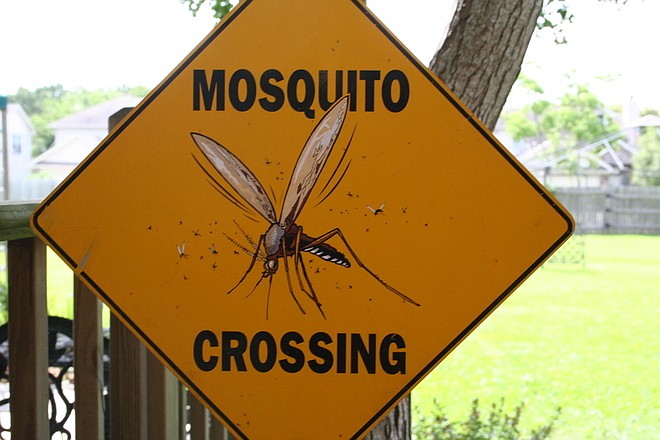- April 26, 2024
-
-
Loading

Loading

The battle is in our backyards, says Christopher Donaghy, a degreed entomologist (Penn State) who now lives in Ormond-by-the-Sea. He’s talking about the annual war between people and the small but dangerous mosquito.
Donaghy points out that while the county sprays in public areas, they don’t spray in backyards, and that’s where mosquitoes can hatch: in bird baths, cans, or anything that holds water, even as small as a bottle cap. One place sometimes overlooked, he says, are plants that can hold water, such as the bromeliad. The way the leaves grow forms an area where water can sit, and that is all the space a mosquito needs to breed.
Dr. Paul Rehme, a veterinarian at the Volusia County Health Dept, agrees that any plant that traps water, or even a hole in a tree, can be a breeding ground. The health department website recommends hosing out the water from the plants at least once a week to disrupt larval activity. Donaghy said that a leaf blower could also be used.
The one-week recommendation also applies to bird baths, which should be replenished with fresh water weekly, as well as other containers.
Another consideration is that the Aedes aegypti, also known as the yellow fever mosquito, the primary carrier of the zika virus, does not travel far. If hatched in a backyard, it’s likely to remain there, Donaghy said. Primarily a day-time biter, it also attacks at night in well-lit areas.
The yellow fever mosquito is common in East Volusia, but rare in West Volusia, according to Rehme. This is because it’s susceptible to the cold, and the west gets more severe freezes because the ocean moderates temperatures.
The Asian tiger mosquito, which can also carry the virus, is also a known local resident.
While the mosquitoes that can carry the zika virus are present in Ormond Beach, the Health Dept. has not yet seen transmission by mosquitoes. All of the 124 current cases in the state, including two in Volusia County, are travel-related. The latest report by the Florida Dept. of Health says there are also 38 cases involving pregnant women, and those are also travel-related. The virus is known to cause birth defects.
For the virus to become transmitted, a mosquito would have to bite someone infectious with the virus, and then infect someone else by biting them. It can also be transmitted sexually between humans.
Rehme points out that Volusia County has dealt with diseases caused by mosquitoes for many years, and has a system in place to watch for problems.
There was one case of West Nile virus last year in the county, and four the year before, which was usually high, he said. This virus is carried by the culex mosquito, common in this area.
A few years ago, there was an outbreak of chikungunya, a disease carried by the yellow fever mosquito. There were 500 cases statewide and 12 in Volusia County.
This experience in dealing with mosquito-borne diseases helps make the county prepared for an outbreak, Rehme said. They have communication with doctors and hospitals to watch for the symptoms, testing procedures in place for the patients, and experience in sending mosquito control personnel out to deal with the mosquito problem.
He said if there is a case, then that would trigger more education and active preventative efforts.
While zika has many people alarmed this year, the threat of mosquito-borne disease is always a possibility, and the need to be cautious and follow recommended guidelines remains each year.
The rules of using repellant and wearing long sleeves and pants, keeping window screens in good shape and eliminating standing water are important every year.
Also, if traveling to a country with an outbreak of the zika virus, Donaghy recommends taking your own repellent, because it is often sold out in the badly affected countries.